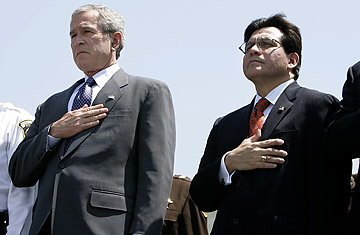
U.S. President George W. Bush, left, and U.S. Attorney General Alberto Gonzales.
(2 of 2)
Weeks after the program was revealed in the New York Times in December of 2005, President Bush held a news conference to address it and said, "It's important for people to understand that this program is so sensitive and so important, that if information gets out [on] how we do it, or how we operate, it will help the enemy." Asked about the hospital visit at a press conference today, President Bush declined to provide specifics, saying that the program was "highly classified." Bush also declined to say whether he himself had authorized Gonzales to have the conversation with Ashcroft, as Comey suggested during his testimony may have been the case.
John Martin, who for 26 years oversaw the Justice Department's counterintelligence division, says he's less worried about the possible divulgence of classified information than he is about Gonzales' and Card's attempt to override Comey, who was acting Attorney General at the time. "That's part of the bad judgment," Martin says of the potential disclosure, but more troubling is that "horrible judgment was demonstrated on the part of Gonzales and Card because they both knew or should have known that the Attorney General while he was so incapacitated had delegated his power to his deputy Jim Comey. Comey's actions were heroic under the circumstances."
To determine whether Gonzales broke the law or not, "You have to know the exact facts," says Elizabeth Parker, Dean of the University of the Pacific Law School and former General Counsel of the National Security Agency. "Obviously things can be discussed in ways that don't divulge highly classified information. The real issue is what is it about this program that is so classified that can't allow it to be discussed in a Congressional setting, even a closed Congressional hearing. In order to have confidence in what this program is all about, one needs to understand better what the approach is and how it affects the rights of American citizens."
Whatever was discussed in that hospital room, one thing is clear — Comey's disclosure of that emergency visit to Ashcroft has further weakened Gonzales' already weak support on Capitol Hill. In the last couple of days, Republican Senator Chuck Hagel has joined the call for the Attorney General's resignation. And Thursday Senators Charles Schumer of New York and Diane Feinstein of California announced they intend to introduce a no-confidence motion against Gonzales in the Senate. Senate majority leader Harry Reid supports the motion and his staff say it could come to the floor as soon as next week.
